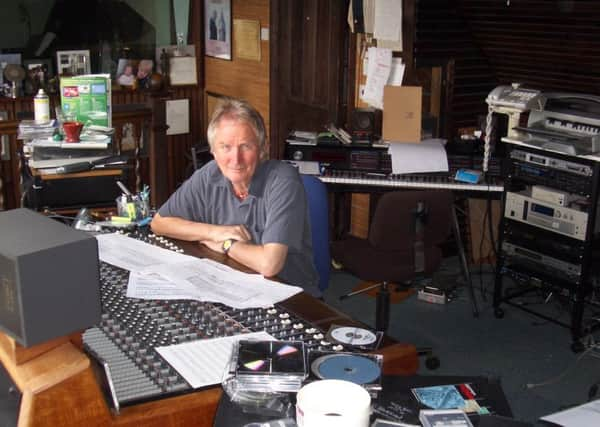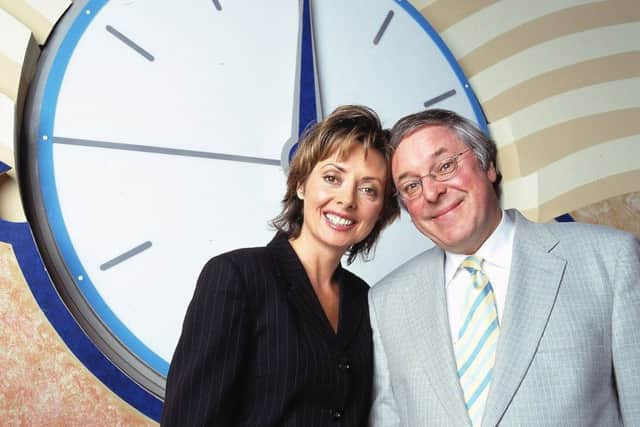From writing Countdown theme to Jay-Z samples: The amazing career of Leeds musician Alan Hawkshaw


Leeds-born musician Alan Hawkshaw might not be the most familiar of characters but pretty much everyone will know his work - for people over 40, he wrote the theme tune for Grange Hill, for everyone else he also penned the irritatingly catchy tune for Channel 4’s Countdown (since co-opted by Eight of Ten Cats Does Countdown) and he is also responsible for one of the most sampled pieces of music in pop. It’s called The Champ and once you hear it, you’ll know it.
During his 50-plus years in the music industry, Hawkshaw has brushed shoulders with the likes of The Beatles, David Bowie and Serge Gainsbourg.
Advertisement
Hide AdAdvertisement
Hide AdDespite his considerable success, he remains close to his Leeds roots, and in particular the city’s College of Music, where his charitable foundation helps students disadvantaged backgrounds.


“I started off as a printer in Leeds,” says the 81-year-old, recalling his early years. “I used to work at Knight & Forster, which was a firm down on Water Lane, and I realised after serving an apprenticeship there’s got to be something better in life than that. During my teens I was working with semi-pro bands – it was all 50s music, dance bands and all this stuff. We were doing gigs round and about Leeds which was fantastic because it would earn an extra couple of quid a week if you got one a week. A couple of quid in those days would pay for your mortgage.”
Around 1959 one of the groups he was in, run by Bill Marsden, turned professional – and invited Hawkshaw to join as piano player. The following year, when the band were booked for a summer season in Blackpool, Hawkshaw quit a secure day job and became a full-time musician. Not everything ran smoothly. Two-thirds of the way through the summer season Hawkshaw was fired when the band realised they could no longer afford his services, but fatefully the guitarist in another band playing in Blackpool spotted an advert in a music paper “from the Grade Organisation auditioning for a job with a well-known star as a piano player”.
Hawkshaw passed with flying colours. “I’d been used to playing more jazzy stuff and the auditions were all three-chord stuff, which was a piece of cake,” he recalls – and became a member of Emile Ford’s band The Checkmates.
Advertisement
Hide AdAdvertisement
Hide AdFord was then a household name, on the back of hits such as What Do You Want To Make Those Eyes at Me For?, and the money was good – £25 a week – but after two years the whole band fell out with Ford.
They managed to find work in Hamburg – at the same time as a then-unknown Beatles.
Hawkshaw remembers: “We started off there at the Top Ten Club and the Star Club, where The Beatles were appearing was just down the street. We used to eat with The Beatles in the seamen’s mission in Hamburg. In fact John Lennon asked me what was it like to be on television because they’d never done anything like that. I can’t remember what I said to him but what I should have said was ‘If you want to be on television you should have a good keyboard player in your band – me’. So I missed my chance to be a Beatle.”
Although The Checkmates soldiered on with little success the 60s, Hawkshaw found himself in demand as a session musician. “Then I got married in ’68 and decided that I could exist on two or three sessions a week without all the schlepping around the country doing one-nighters,” he says. “I was one of the top five keyboard players so we were kept very busy.”
Advertisement
Hide AdAdvertisement
Hide AdOne of those sessions was for John Peel’s Top Gear programme on Radio 1 with a young David Bowie, who was also making a jingle for Luv ice cream. “Ridley Scott was directing it and they picked a piece of music of mine called Luv, which I’d written for a group called Mint.”
During that period Hawkshaw was busy writing library music. “Some of those library pieces were picked for various themes on TV – Grange Hill was one of them, that was originally a library piece of music. Then Channel 4 News, that was much later in 1982.”
Yorkshire Television regularly commissioned music too – including, most famously, for the game show Countdown. “The Countdown theme was done under duress,” Hawkshaw says. “I was doing three series for Yorkshire – one of them was an Arthur C Clarke series which was all synthesised music, it took a long time to put together and they were turning them out one a week. Then they rang me and said ‘We’ve got this pilot we’re putting together for this quiz show, words and numbers, and calling it Countdown – could you give us a demo of some ideas?’ I said ‘What is it?’ They said ‘Thirty-second opening/closing and some clock music where they’re thinking. It has to build. Can you do it?’ I said ‘All right’ then put the phone down and completely forgot about it.
“About a week later the guy rang me and said ‘Have you got anything ready?’ I lied through my teeth and said ‘Yes, I have. I’ll send it as soon as I can’ then I went and wrote the Countdown theme in no time. [Richard] Whiteley used to say, he wrote it in the toilet – and he’s probably right. The demo was pretty awful, to be honest, but they stuck it on the pilot. When I finally saw it, with Richard Whiteley and Carol Vorderman, who was very new to television, I thought ‘This show is not going to last five minutes, it really is bad’. It was the first show ever on Channel 4 in 1982 and it’s still on.”
Advertisement
Hide AdAdvertisement
Hide AdIn the 1990s, Hawkshaw’s vast repertoire of library music began to be rediscovered and released on albums such as The Sound Gallery – now considered part of our culture.
Hip-hop producers, in particular, began to plunder Hawkshaw’s work for samples. The composer has been interviewed for Shawn Lee’s documentary The Library Music Film. He also features in a programme about the Mohawks’ track The Champ – a piece sampled numerous times by the likes of Salt-N-Pepa, Eric B and Rakim, MC Hammer, Ice Cube and De La Soul.
In September Hawkshaw and his friend Brian Bennett, with whom he worked in The Shadows, are due to release a new album on KPM Records, called Full Circle. He’s also in talks with the Northern Film School, based in Leeds, about students making a short animated film featuring his music.
“I am passionate about music and the arts, particularly if it’s in Leeds,” he says. “I’ve got this idea I want to do called The Dragonfly Suite which is about a little girl who gazes in a pool and she wants to be a dragonfly – an animated ballet that’s all orchestral and uplifting. It’s a great chance to get out of the box and make something really special and enter it in a competition or sell it to television. It has no barriers, it has no borders, it’s all visual so it will go to any country. It’s aimed at kids under 10 but it would also be appealing to adults.”
Advertisement
Hide AdAdvertisement
Hide AdThe Alan Hawkshaw Foundation has a longstanding association with the College of Music, helping “underprivileged talent to be given a chance – that’s what we concentrated on when I started it 40 years ago”.
Jay-Z used Alan’s work
Among the famous musicians to have used Alan’s compositions after coming across his work is American rapper Jay-Z.
Hawkshaw says: “People find it and give you a joint composition,” he says.
“I’ve had Jay-Z used a piece called Pray on his Number One album American Gangster with Beyonce singing it.”
Advertisement
Hide AdAdvertisement
Hide AdFor the past 25 years, Hawkshaw has also donated 10 per cent of his income towards the welfare of people less well- off.
“It’s a great way of paying back, the same way as the Foundation,” he says.
“In fact I dedicated quite a portion of the Countdown royalties to go to [Leeds] College [of Music]. That’s where the money’s coming from for that.”